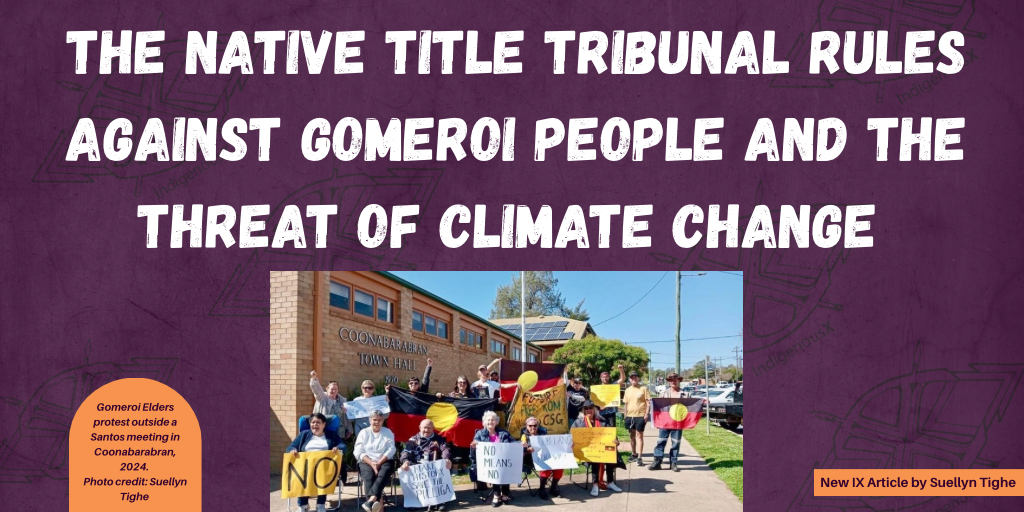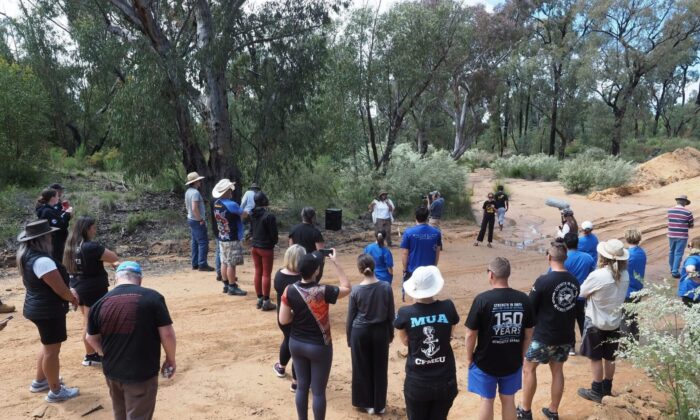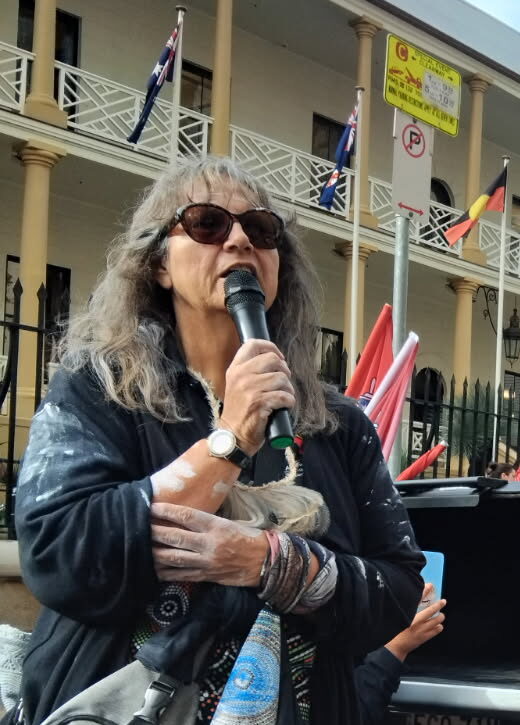The Native Title Tribunal rules against Gomeroi people and the threat of climate change

Last week, the Native Title Tribunal (NTT) ruled again against Gomeroi people and in favour of Santos, granting the resources conglomerate permission to destroy our Native Title rights and proceed with the Pilliga/Narrabri coal seam gas project despite the staunch opposition of our Nation.
The project will see up to 850 Coal Seam Gas wells throughout the majority of the Pilliga forest in the heart of Gomeroi Country. It will divide up the cultural landscape, block access for Gomeroi people, put enormous pressure on groundwater, risk contamination of the lands and waters and release huge volumes of greenhouse gases.
The NTT decision came down as unprecedented flooding overwhelmed communities on the mid-north coast, yet another example of the disastrous impacts of climate change that will be accelerated by this project, an issue that was central to this case.
The Tribunal acknowledged that our knowledge and practices as First Nations people are crucial for maintaining a sustainable relationship with Country. It acknowledged that our people will suffer the most from climate change. But this was all tossed aside in the name of “energy security”.
Racism permeates all aspects of our lives. This decision is just the latest in an onslaught of racist policies and legislations that have attempted to erode our cultural identity and connection to Country.
They have not succeeded. We are still here, fighting the systems designed to deny First Nation peoples our cultural and human rights. And we will continue to fight against Santos, despite this decision.
The Pilliga forest is too important to us culturally and spiritually to ever give up. Our people are united in defence of our culture and our special places.
NTT honours profit, not Peoples
My community has never had faith in this Tribunal, which time and again has ruled against Aboriginal interests and in favour of mining companies.
The NTT initially ruled in favour of Santos back in December 2022. A successful Gomeroi appeal forced another hearing, this time just considering the issue of whether the gas field should be considered in “the public interest,” due to the climate impacts of the project. It is clear the Tribunal accepted that emissions from this project will contribute to global warming and devastating consequences will result from a warming planet.
The Tribunal decision even notes the “compelling evidence from traditional owners concerning the potential impacts of climate change”, discussing the evidence from myself and other Gomeroi about the impact that climate change is already having on the Pilliga and our ability to practice our cultural obligations. My evidence about the destruction caused by the growing intensity and frequency of bushfires was quoted at length. So too was my evidence about the impact of increasing frequency and intensity of droughts on our cultural obligations to maintain sources of water in the Pilliga, including those provided in chains of pools through the forest:
If water levels drop because there’s more droughts because of climate change, that means we can’t exercise our responsibility. It’s our cultural mandate to look after that. Because these chains of pools are sandstone, if we see a drying out of that sandstone to the point where it collapses, that affects that water source and the flow of water. That would impact the story of the Garriya. It also shows that actions have consequences. That’s a common theme throughout a lot of stories: actions have consequences.
The decision acknowledges that the Pilliga is an “important cultural landscape”, saying, “the evidence put before the Tribunal speaks deeply of a place where the way of life, culture and traditions of the Gomeroi people is very much alive… it is evident the place the Pilliga holds in the hearts of Gomeroi people as one of the last relatively untouched places they can practice their culture”.
This is all just lip service. In the end, the Tribunal ruled that the project is “in the public interest” because of the “reliable, secure energy supply” that would be provided by Santos’ gas-field.
While Australia is a world-leading gas producer, the decision notes that most of this gas is already earmarked for export. This means our voices never mattered, and the Pilliga must be sacrificed to guarantee domestic supply while exporters, including Santos, continue to make obscene profits.
The NSW and Commonwealth governments should be urgently investing in renewable energy infrastructure, creating a renewable system in public hands to secure our energy future. Instead they have both supported Santos’ gas-field every step of the way, including in the Tribunal.
The Tribunal decision is full of paternalism, saying that Gomeroi too will benefit from the supposed energy-security provided by the project. It imposes a new condition on Santos’ project – that a Gomeroi ranger program is created to monitor the gas-field. It says that our “traditional Indigenous knowledge” can be used to help mitigate the negative environmental impacts of drilling for gas.
There are hardly any details about this ranger program – how large it will be, how it will be funded. But regardless of whether it’s 2, 20 or even 200 people, this is not our idea of maintaining connection to Country. As a nation, we have been clear that maintaining that connection requires stopping the gas-field entirely.
No more empty words from the Albanese Government
On the night he was reelected, Anthony Albanese made a big point of acknowledging “the traditional owners of the land, their elders past and present, today and every day”, promising “we will be a government that supports reconciliation with First Nations people”. Albanese also promised to govern “for every Australian who knows climate change is a challenge”.
But Albanese’s actions during his first term of government belie these words. He was elected promising serious commitments to climate action, but has strongly backed the Santos project, and other major gas projects across Australia.
Our elders in Coonabarabran are staunch, they are in their 80s and when Santos came to town for meetings they sat there in the sun for hours as part of a non-engagement protest. Albanese needs to show actual respect for our elders and listen to them.
We are demanding he step up now to stop Santos’ destruction of the Pilliga. There are still no Commonwealth environmental approvals for the Lateral Pipe-line that would allow gas from the Pilliga to enter the national system. Denying these approvals would kill the project.
This is a fight not just for Gomeroi Country but for the future of our planet. We feel deep sorrow knowing that emissions from our Country will contribute to Pacific Islands going underwater, to so many climate disasters worldwide.
Since this outrageous decision I have received many messages of support and solidarity. Now is the time to step up the fight and we need you all to join us.

Suellyn Tighe guides a trade union delegation through the Pilliga in 2022 (photo credit Padraic Gibson).




